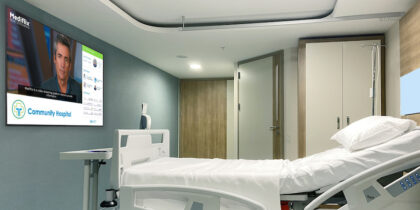Medicare payment penalties tied to readmissions to the hospital within 30 days (which will be eventually extended to 90 days) after discharge for certain diagnoses are driving institutions to devise ways of monitoring patients remotely to help keep a better eye on them. Although some may believe that the quality of home care is more relevant than readmission rates, these penalties are a financial reality for hospitals, and therefore present a prime ROI opportunity for remote patient monitoring (RPM) technologies. Here are five reasons why this type of monitoring is gaining momentum, and how it can benefit patients.
1. Trending data is more important than snapshot data. One of the main advantages of RPM is the collection of multiple data points over time. These points might consist of vital signs (heart rate, respiratory rate, temperature and blood pressure), physical activity levels, other sensor data (blood oxygen level) or chemistry data (blood sugar measurements). Trending data is superior to less frequent snapshot data because it can alert a clinician to worsening levels before the situation becomes severe enough to prompt a return to the hospital. Upon noticing any worsening of symptoms, the patient or caregiver can immediately call or text the monitoring center to receive instructions and answers to questions.
2. The shortage of healthcare providers is real. According to the Council on Physician and Nurse Supply, the current shortage of nurses and physicians “… will continue to increase and there will be too few physicians and nurses to meet future needs.” This shortage has created the demand for mobile technology to bridge monitoring and communications gaps that put patients’ safety at risk.
3. The technology is here. Leading institutions are using comprehensive, high-quality partnered technologies such as those from Samsung and Vivify to remotely monitor pediatric patients. RPM has also been used in cardiology for over 15 years and has demonstrated ease of use, cost savings and improved outcomes.
4. Value-based payment systems will necessitate RPM. Value-based care, which revolves around clinicians getting paid according to the quality of care patients receive instead of the traditional fee for service payments, is the new payment strategy in healthcare. RPM will play a major role in value-based care by increasing ongoing interactions between patients and clinicians via digital messaging and transmission of biological data.
5. A new, world-class healthcare partnership is forming. Recently, Partners HealthCare in Boston, MA and Samsung announced a new partnership to develop the next generation of personalized digital and mobile solutions for health and wellness. The first phase of this collaboration will include software development and clinical research to deliver tools to improve chronic disease management. Dr. Kamal Jethwani, senior director of connected health innovation at Partners, said, “We are excited to have access to the vast capabilities of Samsung Electronics to help improve the way we deliver care to our patients. This joint development program has the potential to significantly propel mHealth and personal connected health forward.”
The continued advancements in new technology and the declining number of healthcare workers ensure that RPM will become a valuable care option for more and more patients.
Learn more about Samsung healthcare solutions to increase patient engagement and reduce expenses.










